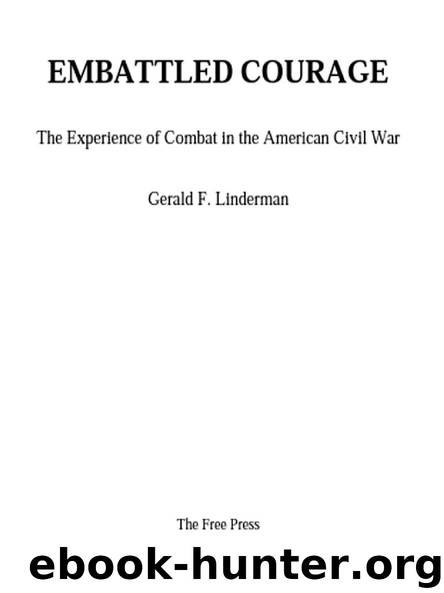Embattled Courage by Gerald F. Linderman

Author:Gerald F. Linderman
Language: eng
Format: epub
Publisher: The Free Press
The Confederate command was never at ease with Mosby’s activities. Stuart, to no avail, urged that he call his companies regulars rather than partisans. Lee several times censured him for raids too obviously aimed at booty and for episodes revealing too emphatically the indiscipline of his forces. The admixture of disdain and envy that Confederate regular regiments felt for partisan activity came to constitute a serious morale problem. Finally, the Confederate Congress repealed legislation authorizing independent commands. Nevertheless, Mosby survived; Lee exempted his companies from reincorporation on the grounds that Mosby’s exploits vitally heartened the South’s civilian population, in whose eyes he was a heroic partisan officer engaged in perfectly legitimate warfare.
The Federals thought otherwise. For them the wrong lay in the relationship between Mosby’s men and the local, pro-Confederate population. Following an action, the raiders ordinarily dispersed, with some of them billeted in their own homes and others returning to sympathizers’ farms until the next rendezvous. Mosby, moreover, continued to recruit locally—his last company was organized in April 1865—and to employ locals as scouts. Although his own contingents were sometimes ambushed, a number of his men captured, and Mosby himself wounded twice, expeditions directed against him ordinarily broke against the rock of local hostility and covert resistance.
The civilian-partisan ties and the frustrations they inflicted on Union commanders angered and inflamed the Federals, who quickly broadened their definition of “enemy” to encompass local civilians. The same change in perception was occurring elsewhere as well, for even minor guerrilla activity had a way of intensifying soldier-civilian hostility very quickly. Elsewhere, too, encumbrances were lifted from the assertion of soldier animosity—standing orders against foraging relaxed or enforcement neglected, guards no longer stationed on private property—but the change came with special drama and comprehensiveness in the region Southerners liked to call Mosby’s Confederacy.
Unable to suppress a small force of men they saw as cowardly freebooters, Union commanders turned on those they supposed sustained Mosby’s resistance. On one occasion Federal officers arrested all the men of Middleburg (on the grounds that many of them must have been Mosbyites) and confined its women to their homes. On another occasion, they threatened to burn the town. Campaigns against Mosby expanded to incorporate the internment of partisan families, the execution of perhaps twelve of those Mosby men who could be captured, and the burning of homes, mills, and crops. At one point Grant ordered the incarceration of all Loudon County men under the age of fifty.
Such actions looked, to their targets and to Southerners at large, like measures of savage cruelty without the slightest justification in Confederate tactics. John Esten Cooke defended Mosby as one who was born and bred and continued to bear himself as a gentleman, “a plain unassuming officer of partisans.” He was convinced that the Northern depiction of Mosby as a villain was attributable solely to Mosby’s military success. He described the scattering of Mosby’s men among local families as if it were merely the solution to a minor problem in quartering, a matter of simple logistical convenience.
Download
This site does not store any files on its server. We only index and link to content provided by other sites. Please contact the content providers to delete copyright contents if any and email us, we'll remove relevant links or contents immediately.
| Africa | Americas |
| Arctic & Antarctica | Asia |
| Australia & Oceania | Europe |
| Middle East | Russia |
| United States | World |
| Ancient Civilizations | Military |
| Historical Study & Educational Resources |
1861 by Adam Goodheart(1051)
Smithsonian Civil War by Smithsonian Institution(1011)
Abraham Lincoln: A Life, Volume 2 by Michael Burlingame(971)
The Fiery Trial by Eric Foner(940)
Battle Cry of Freedom by James M. McPherson(937)
Ulysses S. Grant by Michael Korda(934)
Rebel Yell: The Violence, Passion, and Redemption of Stonewall Jackson by S. C. Gwynne(929)
Rock of Chickamauga(927)
101 Things You Didn't Know About Lincoln by Brian Thornton(910)
Abraham Lincoln in the Kitchen by Rae Katherine Eighmey(865)
This Republic of Suffering: Death and the American Civil War by Drew Gilpin Faust(846)
Bloody Engagements by John R. Kelso(821)
Lincoln's Lieutenants by Stephen W. Sears(807)
Leaves of Grass by Walt Whitman(802)
Union by Colin Woodard(800)
The escape and suicide of John Wilkes Booth : or, The first true account of Lincoln's assassination, containing a complete confession by Booth(781)
1861: The Civil War Awakening by Adam Goodheart(755)
Rise to Greatness by David Von Drehle(738)
The Fiery Trial: Abraham Lincoln and American Slavery by Eric Foner(734)
